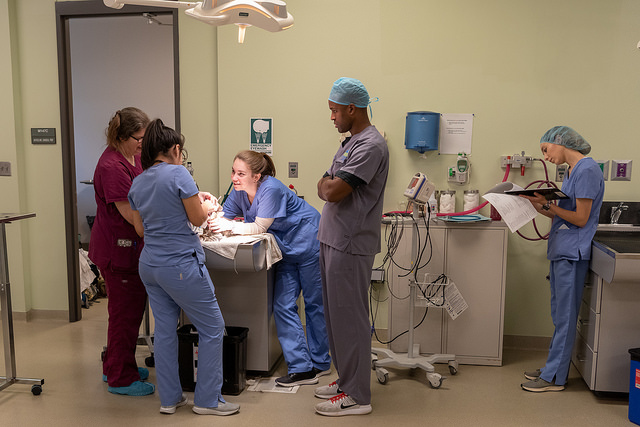Last updated on September 26, 2019
Did you know that you can study to become a Veterinary Technician at Cedar Valley College with Dallas Community Colleges? In fact, you can take classes on campus or online. Vet techs serve on the front lines of animal care after surgeries and illnesses in veterinary clinics. Vet techs may also help provide routine care for your pet. In case you’re wondering what a vet tech does, we have you covered.
Veterinary Technician vs. Veterinary Assistant?
You may hear vet tech and vet assistant used interchangeably but they have different roles.
Veterinary assistants provide basic care such as cleaning or feeding and providing water to animals at the clinic. They may also assist with X-rays or injections.
Licensed veterinary technicians monitor animals under anesthesia, take X-rays and run lab tests. If you decide to earn your Associate of Applied Science degree in Veterinary Technology, you will be eligible to take national and state licensing exams.
How to Become a Veterinary Technician
Cedar Valley College is the only college of Dallas Community Colleges that offers the Veterinary Technology Program. This program includes:
- Veterinary Technology Associate in Applied Science Degree, classes are available on campus and online. This program can be completed in two years if you’re a full-time student. Graduates of the program are eligible to take the Texas Examination for Registered Veterinary Technicians (RVT) and the Veterinary Technician National Examination.
- Small Animal Assisting Certificate, is an on-site credit certification that can be completed in two semesters.
- Large Animal Assisting Certificate, is an on-site credit certification that can be completed in two semesters.
Do I Have to Be Certified?
Yes! The state of Texas requires you to take the Texas Examination for Registered Veterinary Technicians (RVT) and the Veterinary Technician National Examination. Both exams are required for registration in the state of Texas and the Veterinary Technician National Examination is required for credentialing as a technician by several other states.
Veterinary Technician Role:
Veterinary technicians perform medical tests under the supervision of a licensed veterinarian to help treat animals. You may be responsible for the following duties:
- Help monitor anesthesia and assist in surgeries
- Prepare vaccines and serums
- Running lab tests to help treat and diagnose animals
- Sterilizing and maintaining equipment
Where Can I Work as a Vet Tech?
Most vet techs work in veterinary hospitals or clinics but that doesn’t mean you are limited to working in an animal clinic. Other possible places to work include:
- Animal shelters
- Zoos and animal parks
- College and university veterinary programs and teaching hospitals
- Veterinary medical suppliers or distributors

“My Dallas Community Colleges experience prepared me to both pass my boards and also feel prepared for a real-life career. The program helped me see many opportunities for veterinary technicians. There is a common misconception that all graduates of vet tech programs go on to work at a general small-animal practice, but the truth is that your options are endless as long as you are willing to continue to learn!” Read more about Ksenia’s story and her experience in the vet tech program.
Important Qualities
Although loving animals is a huge part of this career, it’s important to be well-rounded and be able to communicate and work with clients. Here are some important qualities to have as a vet tech:
- Communication skills. Vet techs spend a lot of time communicating with the owner of the animal, as well as staff and supervisors.
- Detail oriented. You will be required to take down accurate information, perform diagnostic tests and administer medication to a variety of animals.
- Problem-solving skills. Your problem-solving skills will come into play when working with animals. It will be part of your job to identify injuries and illnesses to provide the appropriate treatment.
- Physical strength. You will need to be able to manage and lift animals.
Ready to Get Started!
Complete the admissions process and meet with an academic advisor at Cedar Valley College. You may be wondering, how much will the vet tech program cost me? Dallas County residents pay $177 per three-hour class! Where else can you take a full-semester of 12 credit hours for $708. Don’t take our word for it— you can calculate your tuition. Not a Dallas County resident? No worries, we have you covered as well.
While you’re here, you should also consider checking out our previous programs of the month.
